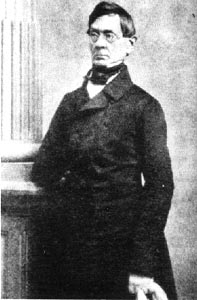Anton Schindler facts for kids
Anton Felix Schindler (born June 13, 1795, died January 16, 1864) was an Austrian law clerk. He is best known for being a close friend and secretary to the famous composer Ludwig van Beethoven. Schindler also wrote one of the first biographies about Beethoven.
Contents
Schindler's Life and Connection to Beethoven
Schindler moved to Vienna in 1813 to study law. He was a good violinist and played in music groups. He first met Beethoven in 1814. In 1822, he stopped working in law. He became the first violinist at the Theater in der Josefstadt. Later, in 1825, he was the first violinist at the Theater am Kärntnertor.
From 1822, Schindler lived in Beethoven's house. He worked as Beethoven's unpaid secretary. This meant he helped Beethoven with many daily tasks. In March 1825, Beethoven and Schindler had a disagreement. Another violinist, Karl Holz, became Beethoven's secretary. But Schindler and Beethoven became friends again in August 1826. Schindler continued to help Beethoven.
After Beethoven died in 1827, Schindler moved to Budapest. He worked there as a music teacher. He returned to Vienna in 1829. In 1831, he moved to Münster and became a music director. From 1835 to 1840, he was the city music director in Aachen.
In 1840, Schindler's book about Beethoven was published. He released new versions in 1845, 1860, and 1871. In 1841 and 1842, Schindler visited Paris. There, he met many famous musicians of that time.
Schindler owned many of Beethoven's belongings after the composer's death. This included about 400 "conversation books." Beethoven used these books to talk with friends when he could no longer hear well. The Royal Prussian Library in Berlin bought 136 of these books in 1845. Schindler kept the rest, and it is thought they were later destroyed.
How Reliable Was Schindler's Information?
For a long time, people thought Schindler's book was the main source of information about Beethoven. But over time, experts found problems with his stories.
Starting in the 1970s, music experts showed that Schindler had changed some entries in Beethoven's conversation books. He added many false notes after Beethoven died. Experts also found that Schindler had made his close friendship with Beethoven seem longer than it was. He claimed it was 11 or 12 years, but it was probably closer to 5 or 6 years.
Many believe Schindler also burned more than half of Beethoven's conversation books. He may have also removed pages from the books that survived. Because of this, many experts say that almost nothing Schindler wrote can be trusted unless other evidence supports it.
However, some of Schindler's information is still helpful. For example, his notes on how Beethoven played his own piano music are important. Dr. George Barth wrote a book that uses Schindler's accounts to understand Beethoven's piano playing style. This style was different from what other musicians like Carl Czerny described.
Despite this, most music historians still do not fully trust Schindler. They especially question his ideas about Beethoven changing the speed of his music often. They prefer to rely on what Czerny and Ferdinand Ries said. Both of them knew Beethoven much longer than Schindler did.
Schindler in Movies
Anton Schindler is an important character in the movie Immortal Beloved. This film tells a fictional story about Beethoven's life. In the movie, Schindler tries to find out who Beethoven's "Immortal Beloved" was. This was the mysterious person Beethoven wrote a famous love letter to. The Dutch actor Jeroen Krabbé plays Schindler in the film.
Works by Schindler
- Anton Schindler (1840): Biographie von Ludwig van Beethoven. [Biography of Ludwig van Beethoven.] Münster. (This book had new editions in 1845, 1860, and 1927.)
- Anton Felix Schindler, Ignaz Moscheles (editors), The life of Beethoven: including numerous characteristic traits and remarks on his musical works, Volumes 1-2, Gamut Music Co., 1966 (This was a translated and republished version of his work.)
See also
 In Spanish: Anton Felix Schindler para niños
In Spanish: Anton Felix Schindler para niños
 | Sharif Bey |
 | Hale Woodruff |
 | Richmond Barthé |
 | Purvis Young |


